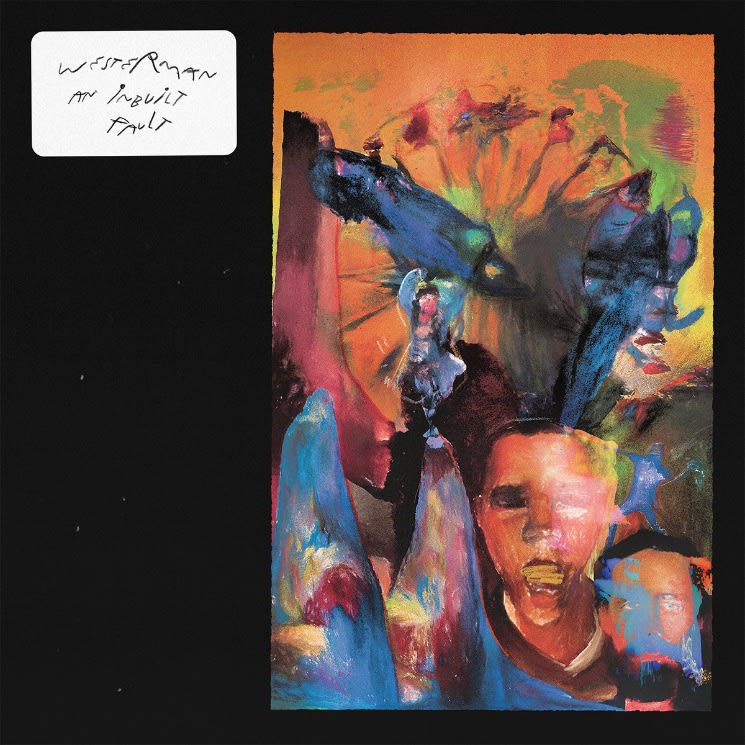On Westerman's second full-length album, the London-raised, Athens-based songwriter is questioning everything: where he's living (he moved to Greece while writing the album), what he's doing ("Why more records when everything's melting?"), and what's coming next (at one point exclaiming, "Are you as afraid as I am?").
Bigger, bolder, and even more exploratory than his 2020 debut Your Hero Is Not Dead, An Inbuilt Fault sees William Westerman drenched in self-consciousness, trapped between wanting to block out the world around him and trying to find some glimmers of light in it. He sings, on the soaring chorus of "CSI: Petralona," "Won't you place your hands over my ears?" Given the anxieties littering the rest of the album, you can't blame him for wanting to tune things out. Thankfully though, Westerman commits to seeing every feeling through, and following them wherever they lead.
And this album goes all over. Through free-flowing arrangements and stream-of-consciousness lyrics, Westerman wanders through intimate scenes in Greek villages and into the foggy spaces of his memory. The chameleonic blend of acoustic and digital sounds throughout An Inbuilt Fault are anchored by Westerman's voice, a soothing composite of James Blake and Morrissey, which is most potent when clear and vulnerable. The album is co-produced by Big Thief's James Krivchenia, made obvious on album highlights like "Idol: RE-run," with tenderly complex percussion (reminiscent of the title track of Dragon New Warm Mountain I Believe in You). Some of the free sonic movement of the album may also be informed by Luke Temple's contributions on piano, electric guitar, synth, and bass.
While An Inbuilt Fault's attention to detail and some of its sonic flourishes (especially the sudden falsetto outbursts), are reminiscent of Bon Iver, Bon Iver, Westerman is more concerned with moving along than he is with fleshing out the sound and feeling of a single place or state. The album occasionally diverges into jazzy passages ("Help Didn't Help at All" grooves like a Men I Trust song) and instrumental jams, such as the playful extended groove that opens "A Lens Turning." Occasionally, this willingness to follow a song wherever it goes can dilute its effect; the album's two-minute instrumental outro feels overindulgent, and the occasional lyric can feel too overt, as when Westerman proclaims the cliché "I don't know who I am anymore."
However, Westerman almost always balances visceral expression with poetic recollection. On "Take," for instance, he tenderly sings: "When I think of you / I see a child crying / Humming this tune / Singing, taking breaks the heart of love." Westerman is adept at taking fragmented images, attaching them to profound emotions, and expressing this concoction of ambiguous feeling with stunning beauty. The album's gorgeous title track serves as the ultimate example of his abilities, using every moment of its nearly 7-minute run time to float seamlessly through interconnected melodies, sonic landscapes, and fragmented lyrics — it manages, like much of the record, to speak to both universal and deeply personal struggles.
(Partisan)Bigger, bolder, and even more exploratory than his 2020 debut Your Hero Is Not Dead, An Inbuilt Fault sees William Westerman drenched in self-consciousness, trapped between wanting to block out the world around him and trying to find some glimmers of light in it. He sings, on the soaring chorus of "CSI: Petralona," "Won't you place your hands over my ears?" Given the anxieties littering the rest of the album, you can't blame him for wanting to tune things out. Thankfully though, Westerman commits to seeing every feeling through, and following them wherever they lead.
And this album goes all over. Through free-flowing arrangements and stream-of-consciousness lyrics, Westerman wanders through intimate scenes in Greek villages and into the foggy spaces of his memory. The chameleonic blend of acoustic and digital sounds throughout An Inbuilt Fault are anchored by Westerman's voice, a soothing composite of James Blake and Morrissey, which is most potent when clear and vulnerable. The album is co-produced by Big Thief's James Krivchenia, made obvious on album highlights like "Idol: RE-run," with tenderly complex percussion (reminiscent of the title track of Dragon New Warm Mountain I Believe in You). Some of the free sonic movement of the album may also be informed by Luke Temple's contributions on piano, electric guitar, synth, and bass.
While An Inbuilt Fault's attention to detail and some of its sonic flourishes (especially the sudden falsetto outbursts), are reminiscent of Bon Iver, Bon Iver, Westerman is more concerned with moving along than he is with fleshing out the sound and feeling of a single place or state. The album occasionally diverges into jazzy passages ("Help Didn't Help at All" grooves like a Men I Trust song) and instrumental jams, such as the playful extended groove that opens "A Lens Turning." Occasionally, this willingness to follow a song wherever it goes can dilute its effect; the album's two-minute instrumental outro feels overindulgent, and the occasional lyric can feel too overt, as when Westerman proclaims the cliché "I don't know who I am anymore."
However, Westerman almost always balances visceral expression with poetic recollection. On "Take," for instance, he tenderly sings: "When I think of you / I see a child crying / Humming this tune / Singing, taking breaks the heart of love." Westerman is adept at taking fragmented images, attaching them to profound emotions, and expressing this concoction of ambiguous feeling with stunning beauty. The album's gorgeous title track serves as the ultimate example of his abilities, using every moment of its nearly 7-minute run time to float seamlessly through interconnected melodies, sonic landscapes, and fragmented lyrics — it manages, like much of the record, to speak to both universal and deeply personal struggles.
